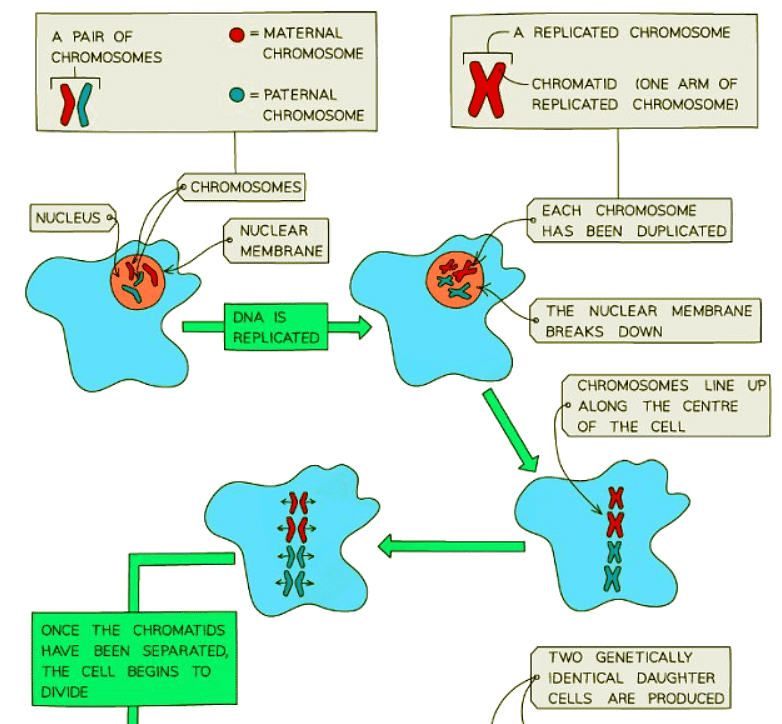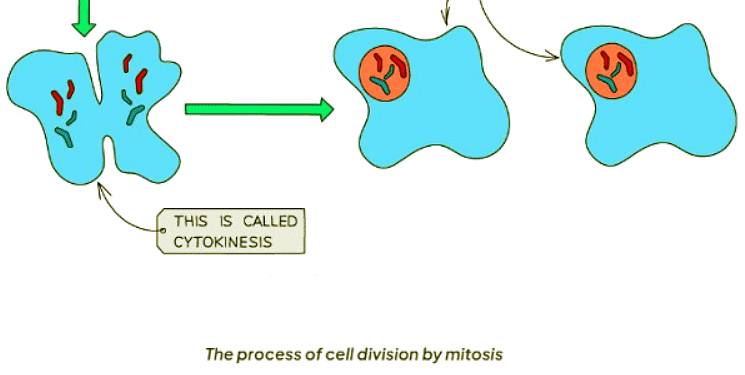Class 10 Exam > Class 10 Notes > Biology for GCSE/IGCSE > Mitosis
Mitosis | Biology for GCSE/IGCSE - Class 10 PDF Download
New Cells are Made by Mitosis
Mitosis - Basics
- Most body cells possess a pair of each chromosome, referred to as diploid cells.
- Before cell division, chromosomes replicate, ensuring that the resulting daughter cells also contain a complete set of chromosomes.
- Diploid cells maintain genetic stability by preserving the chromosome count during cell division.
- Mitosis is crucial for various biological processes such as growth, repairing damaged tissues, replacing old cells, and asexual reproduction.
- Mitosis refers to the division of the cell nucleus, resulting in the production of genetically identical daughter cells.


Process
The process of cell division by mitosis involves the following steps:
- Just before mitosis, each chromosome in the nucleus copies itself exactly, forming X-shaped chromosomes.
- Chromosomes line up along the center of the cell, where cell fibers pull them apart.
- The cell divides into two, and each new cell contains a copy of each of the chromosomes.
Importance
- All cells in the body (excluding gametes) are produced by mitosis of the zygote.
- Mitosis is essential for replacing cells, such as skin cells and red blood cells, and for enabling growth, for instance, the production of new cells when a zygote divides to form an embryo.
Occurs in
- Growth: Mitosis is a crucial process for the growth of living organisms as it continually produces new cells.
- Repair: Damaged or dead cells in the body are replaced through the process of mitosis, ensuring proper functioning of tissues and organs.
- Asexual Reproduction: In some organisms, mitosis is responsible for asexual reproduction, where offspring are exact genetic copies of the parent.
Mitosis & Stem Cells: In-Depth Explanation
- Presence of Stem Cells in Human Tissues: Various tissues in the human body contain a limited number of unspecialized cells known as stem cells.
- Function of Stem Cells: Stem cells have the unique ability to divide through mitosis, generating new daughter cells that can specialize and undertake specific functions within the tissue.
- Role of Zygote: The zygote represents the fundamental stem cell, dividing multiple times via mitosis to form a cluster of unspecialized cells, termed embryonic stem cells.
- Embryonic Stem Cells Development: These embryonic stem cells, initially identical, gradually differentiate as the fetus matures, acquiring distinct characteristics and purposes.
Mitosis and Embryonic Stem Cells
- When a zygote undergoes multiple divisions through mitosis, it transforms into a cluster of undifferentiated cells, typically comprising 200 to 300 cells. These cells are recognized as embryonic stem cells.
- Embryonic stem cells are initially identical and commence the process of specialization as the embryo matures, acquiring distinct characteristics.
- As embryonic stem cells progress in development, they evolve into various cell types, each serving a unique purpose in the growing fetus.
Question for MitosisTry yourself: What is the purpose of mitosis in the human body?View Solution
The document Mitosis | Biology for GCSE/IGCSE - Class 10 is a part of the Class 10 Course Biology for GCSE/IGCSE.
All you need of Class 10 at this link: Class 10
|
110 videos|210 docs|33 tests
|
FAQs on Mitosis - Biology for GCSE/IGCSE - Class 10
| 1. Why is mitosis important for the production of new cells? |  |
Ans. Mitosis is important for the production of new cells because it is the process by which a single cell divides into two identical daughter cells, ensuring growth, repair, and replacement of damaged or old cells in the body.
| 2. How do stem cells play a role in mitosis? |  |
Ans. Stem cells have the ability to divide and differentiate into various cell types through mitosis, making them essential for replenishing and repairing damaged tissues in the body.
| 3. Can mitosis occur in all cell types? |  |
Ans. Yes, mitosis can occur in most cell types in the body, except for specialized cells like nerve cells and muscle cells, which have limited or no ability to undergo cell division.
| 4. How does mitosis differ from meiosis in terms of cell division? |  |
Ans. Mitosis results in the production of two identical daughter cells with the same number of chromosomes as the parent cell, while meiosis is a specialized type of cell division that produces four genetically unique daughter cells with half the number of chromosomes.
| 5. What role does mitosis play in the growth and development of an organism? |  |
Ans. Mitosis is essential for the growth and development of an organism as it allows for the production of new cells to replace old or damaged ones, ensuring proper tissue growth and organ function.
Related Searches




















